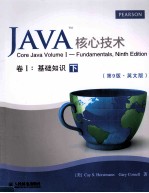图书介绍
JAVA核心技术 卷1 基础知识 下 第9版英文版PDF|Epub|txt|kindle电子书版本网盘下载

- (美)CAY S.HORSTMANN,GARY CORNELL著 著
- 出版社: 北京:人民邮电出版社
- ISBN:9787115319470
- 出版时间:2013
- 标注页数:974页
- 文件大小:72MB
- 文件页数:419页
- 主题词:JAVA语言-程序设计-英文
PDF下载
下载说明
JAVA核心技术 卷1 基础知识 下 第9版英文版PDF格式电子书版下载
下载的文件为RAR压缩包。需要使用解压软件进行解压得到PDF格式图书。建议使用BT下载工具Free Download Manager进行下载,简称FDM(免费,没有广告,支持多平台)。本站资源全部打包为BT种子。所以需要使用专业的BT下载软件进行下载。如BitComet qBittorrent uTorrent等BT下载工具。迅雷目前由于本站不是热门资源。不推荐使用!后期资源热门了。安装了迅雷也可以迅雷进行下载!
(文件页数 要大于 标注页数,上中下等多册电子书除外)
注意:本站所有压缩包均有解压码: 点击下载压缩包解压工具
图书目录
Chapter 10:Deploying Applications and Applets565
10.1 JAR Files566
10.1.1 The Manifest567
10.1.2 Executable JAR Files568
10.1.3 Resources569
10.1.4 Sealing573
10.2 Java Web Start574
10.2.1 The Sandbox578
10.2.2 Signed Code579
10.2.3 The JNLP API582
10.3 Applets591
10.3.1 A Simple Applet591
10.3.1.1 Converting Applications to Applets595
10.3.2 The applet HTML Tag and Its Attributes596
10.3.3 The object Tag599
10.3.4 Use of Parameters to Pass Information to Applets600
10.3.5 Accessing Image and Audio Files606
10.3.6 The Applet Context607
10.3.6.1 Inter-Applet Communication608
10.3.6.2 Displaying Items in the Browser609
10.4 Storage of Application Preferences610
10.4.1 Property Maps611
10.4.2 The Preferences API616
Chapter 11:Exceptions,Assertions,Logging,and Debugging625
11.1 Dealing with Errors626
11.1.1 The Classification of Exceptions628
11.1.2 Declaring Checked Exceptions630
11.1.3 How to Throw an Exception632
11.1.4 Creating Exception Classes634
11.2 Catching Exceptions635
11.2.1 Catching Multiple Exceptions637
11.2.2 Rethrowing and Chaining Exceptions639
11.2.3 The finally Clause640
11.2.4 The Try-with-Resources Statement644
11.2.5 Analyzing Stack Trace Elements646
11.3 Tips for Using Exceptions649
11.4 Using Assertions653
11.4.1 Assertion Enabling and Disabling654
11.4.2 Using Assertions for Parameter Checking655
11.4.3 Using Assertions for Documenting Assumptions656
11.5 Logging657
11.5.1 Basic Logging658
11.5.2 Advanced Logging658
11.5.3 Changing the Log Manager Configuration661
11.5.4 Localization662
11.5.5 Handlers663
11.5.6 Filters667
11.5.7 Formatters667
11.5.8 A Logging Recipe668
11.6 Debugging Tips677
11.7 Tips for Troubleshooting GUI Programs682
11.7.1 Letting the AWT Robot Do the Work686
11.8 Using a Debugger690
Chapter 12:Generic Programming697
12.1 Why Generic Programming?698
12.1.1 Who Wants to Be a Generic Programmer?699
12.2 Defining a Simple Generic Class700
12.3 Generic Methods702
12.4 Bounds for Type Variables704
12.5 Generic Code and the Virtual Machine706
12.5.1 Translating Generic Expressions708
12.5.2 Translating Generic Methods708
12.5.3 Calling Legacy Code711
12.6 Restrictions and Limitations712
12.6.1 Type Parameters Cannot Be Instantiated with Primitive Types712
12.6.2 Runtime Type Inquiry Only Works with Raw Types712
12.6.3 You Cannot Create Arrays of Parameterized Types713
12.6.4 Varargs Warnings713
12.6.5 You Cannot Instantiate Type Variables715
12.6.6 Type Variables Are Not Valid in Static Contexts of Generic Classes717
12.6.7 You Cannot Throw or Catch Instances of a Generic Class717
12.6.7.1 You Can Defeat Checked Exception Checking718
12.6.8 Beware of Clashes after Erasure720
12.7 Inheritance Rules for Generic Types721
12.8 Wildcard Types723
12.8.1 Supertype Bounds for Wildcards725
12.8.2 Unbounded Wildcards728
12.8.3 Wildcard Capture728
12.9 Reflection and Generics731
12.9.1 Using Class<T>Parameters for Type Matching732
12.9.2 Generic Type Information in the Virtual Machine733
Chapter 13:Collections741
13.1 Collection Interfaces741
13.1.1 Separating Collection Interfaces and Implementation742
13.1.2 Collection and Iterator Interfaces in the Java Library745
13.1.2.1 Iterators745
13.1.2.2 Removing Elements748
13.1.2.3 Generic Utility Methods748
13.2 Concrete Collections751
13.2.1 Linked Lists752
13.2.2 Array Lists762
13.2.3 Hash Sets763
13.2.4 Tree Sets767
13.2.5 Object Comparison768
13.2.6 Queues and Deques774
13.2.7 Priority Queues776
13.2.8 Maps777
13.2.9 Specialized Set and Map Classes782
13.2.9.1 Weak Hash Maps782
13.2.9.2 Linked Hash Sets and Maps783
13.2.9.3 Enumeration Sets and Maps785
13.2.9.4 Identity Hash Maps785
13.3 The Collections Framework787
13.3.1 Views and Wrappers792
13.3.1.1 Lightweight Collection Wrappers793
13.3.1.2 Subranges794
13.3.1.3 Unmodifiable Views794
13.3.1.4 Synchronized Views796
13.3.1.5 Checked Views796
13.3.1.6 A Note on Optional Operations797
13.3.2 Bulk Operations799
13.3.3 Converting between Collections and Arrays800
13.4 Algorithms801
13.4.1 Sorting and Shuffling802
13.4.2 Binary Search805
13.4.3 Simple Algorithms806
13.4.4 Writing Your Own Algorithms808
13.5 Legacy Collections810
13.5.1 The Hashtable Class810
13.5.2 Enumerations810
13.5.3 Property Maps811
13.5.4 Stacks812
13.5.5 Bit Sets813
13.5.5.1 The""Sieve of Eratosthenes""Benchmark814
Chapter 14:Multithreading819
14.1 What Are Threads?820
14.1.1 Using Threads to Give Other Tasks a Chance827
14.2 Interrupting Threads833
14.3 Thread States836
14.3.1 New Threads836
14.3.2 Runnable Threads836
14.3.3 Blocked and Waiting Threads837
14.3.4 Terminated Threads839
14.4 Thread Properties839
14.4.1 Thread Priorities840
14.4.2 Daemon Threads841
14.4.3 Handlers for Uncaught Exceptions841
14.5 Synchronization843
14.5.1 An Example of a Race Condition843
14.5.2 The Race Condition Explained848
14.5.3 Lock Objects850
14.5.4 Condition Objects854
14.5.5 The synchronized Keyword859
14.5.6 Synchronized Blocks864
14.5.7 The Monitor Concept865
14.5.8 Volatile Fields866
14.5.9 Final Variables867
14.5.10 Atomics868
14.5.11 Deadlocks868
14.5.12 Thread-Local Variables871
14.5.13 Lock Testing and Timeouts873
14.5.14 Read/Write Locks874
14.5.15 Why the stop and suspend Methods Are Deprecated875
14.6 Blocking Queues877
14.7 Thread-Safe Collections886
14.7.1 Efficient Maps,Sets,and Queues886
14.7.2 Copy on Write Arrays888
14.7.3 Older Thread-Safe Collections888
14.8 Callables and Futures890
14.9 Executors895
14.9.1 Thread Pools896
14.9.2 Scheduled Execution900
14.9.3 Controlling Groups of Tasks901
14.9.4 The Fork-Join Framework902
14.10 Synchronizers905
14.10.1 Semaphores906
14.10.2 Countdown Latches907
14.10.3 Barriers907
14.10.4 Exchangers908
14.10.5 Synchronous Queues908
14.11 Threads and Swing909
14.11.1 Running Time-Consuming Tasks910
14.11.2 Using the Swing Worker915
14.11.3 The Single-Thread Rule923
Appendix:Java Keywords925
Index929